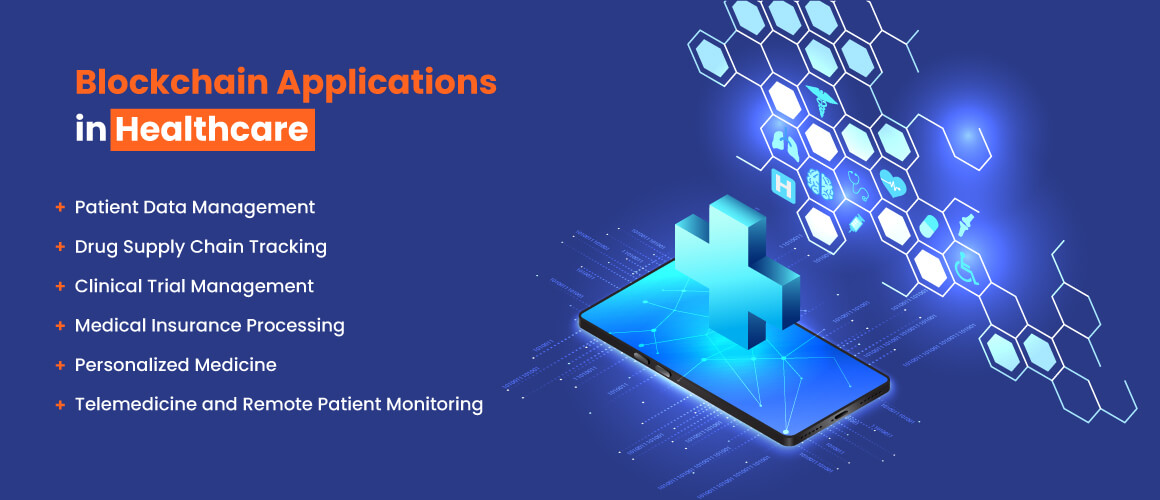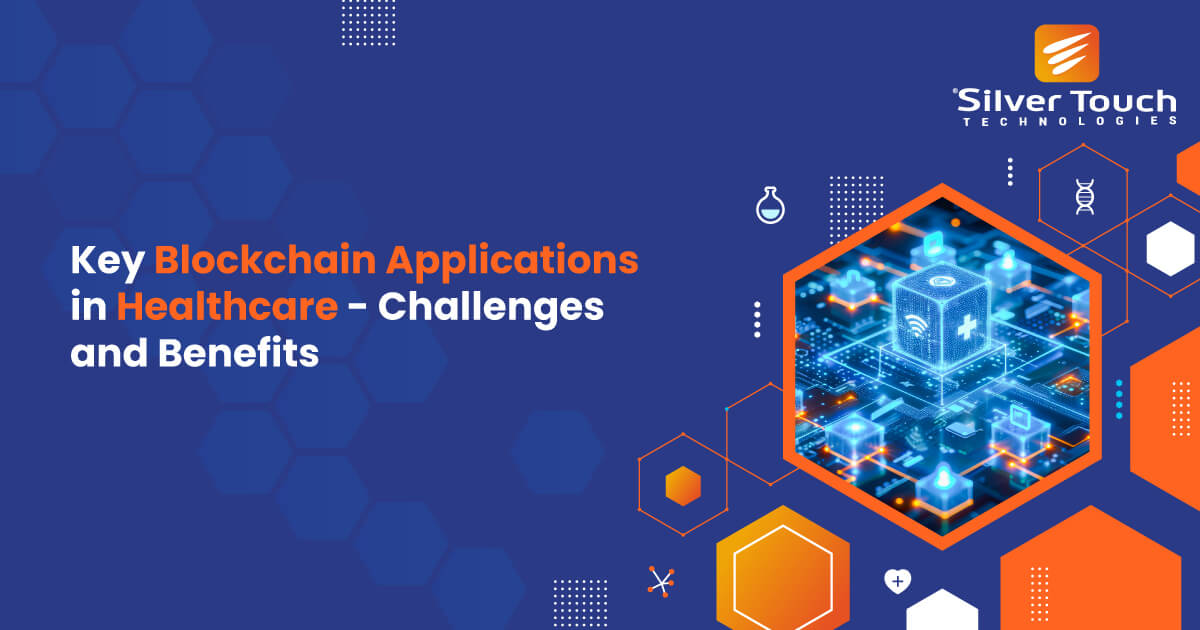The healthcare industry faces multiple challenges in this digital age. One of the biggest challenges is the protection of confidential patient data. Another nail in the coffin is healthcare sector is the most vulnerable to cyber-attacks. The lack of interoperability between healthcare service providers is also a major issue. Here, technology comes to the rescue in the form of Blockchain in healthcare.
This post talks about the benefits of Blockchain applications in healthcare. But before moving ahead, let’s understand the importance of Blockchain technology in the sector.
Impact of Blockchain Technology
Blockchain is a digital ledger that stores the patient’s data in a block and makes a chain of information. Its key features are security, transparency, auditability, and immutability useful for keeping the patient’s information secure yet accessible. Doctors and researchers can easily share and access the information with improved accountability.
Simply put, the patient’s medical data is secure and privacy is assured with Blockchain technology in healthcare sector. This technology can enhance trust and improve various aspects of healthcare services through robust applications. Let’s go through some major challenges of the healthcare sector that Blockchain can address effectively.
Key Healthcare Challenges that Blockchain Can Address
The modern healthcare system faces many challenges related to data security, privacy protection, medical supply chains, and even claims processing. Blockchain technology in healthcare sector can address these challenges successfully. Let’s have a look at such challenges and how Blockchain technology brings its solution.
Data Security and Privacy Protection
Protecting the patient’s sensitive data and their privacy is of the utmost importance for healthcare organizations. These organizations deal with numerous information including medical histories, insurance details, and social security numbers of patients. As a result, hackers find it a soft target for fraud and identity theft.
Moreover, healthcare service providers must safeguard the patient’s data under HIPAA and other regional regulations. The increasing frequency and level of cyberattacks pose a larger threat to data and privacy protection.
Interoperability and Transparency
Another major issue that the healthcare industry faces is the lack of information sharing across different healthcare systems. Patients see multiple doctors and specialists who have their EHR (Electronic Health Record) systems. As these systems cannot communicate with one another, the patient’s records largely remain fragmented. It leads to diagnosis and treatment-related errors.
Counterfeit Drugs and Irregularities
Counterfeit drugs can cost the patient’s life. Fake drugs with incorrect or adulterated ingredients and even harmful substances become a serious threat to the patient’s safety. They may lead to worsening health outcomes and ruin the organization’s reputation.
Such drugs and other irregularities can lead to legal consequences for hospitals and medical service organizations. However, it is always difficult to track such drugs due to complex medical supply chains.
Medical Supply Chain Inefficiencies
The medical supply chain consists of manufacturers, distributors, pharmacies, and wholesalers. In such complexity, lack of transparency and interoperability make things difficult to track drugs and other medical supplies. It results in inefficiencies and delays.
Moreover, opacity in the pharmaceutical supply chains enables counterfeiters to introduce fake and substandard medications into the market. All these inefficiencies can reduce the patient’s trust in the system over the period.
Claims Processing and Billing
Medical insurance claims pass through a slow and cumbersome process. Both patients and medical service providers encounter delays and errors in billing frequently. It leads to frustration and increased administrative costs. Moreover, stringent insurance regulations and a lack of standardization can increase inefficiencies. These aspects contribute to enhancing payment issues.
Here we mention some useful Blockchain applications in healthcare industry.
Blockchain Applications in Healthcare

Blockchain technology offers a range of applications for the healthcare sector. Some of the key applications include-
Patient Data Management
Blockchain can transform the way physicians can store and access the patient’s medical history.
Drug Supply Chain Tracking
This technology can bring transparency to the pharmaceutical and medical supply chain.
Clinical Trial Management
Blockchain-based applications can ensure the integrity and security of trial data for more accountability.
Medical Insurance Processing
This technology enables healthcare service providers to streamline claim processing and settlement.
Healthcare Invoicing
Blockchain-powered billing applications can eliminate the chances of fraud and misuse effectively.
Personalized Medicine
An application for personalized medicine can preserve the patient’s privacy and improve accessibility.
Telemedicine and Remote Patient Monitoring
Telemedicine apps with blockchain can ensure the security and privacy of the patient’s data every time.
A reputed blockchain application development company can make the app with desired features and seamless performance to offer various benefits to patients and healthcare service providers.
Benefits of Blockchain in Healthcare Sector
The decentralized nature of Blockchain can make patient data more secure reducing vulnerability to breaches. Moreover, these apps can prevent unauthorized access effectively and increase transparency across departments.
The immutability of Blockchain is useful for protecting privacy and establishing a clear audit trail for all transactions. It enhances accountability and helps the healthcare sector prevent the entry of counterfeit medicine.
Apart from security, Blockchain technology can streamline claims processing and billing-related tasks. It can reduce paperwork and minimize delays while eliminating the chances of human errors or intervention.
Simply put, Blockchain in the healthcare sector makes the system more transparent, efficient, secure, and accessible. It facilitates healthcare services providers to build a patient-focused system with the help of dedicated apps.
Concluding Lines
Blockchain development has multiple benefits to offer for the healthcare industry. All its characteristics can make the system patient-focused and transparent so that people can trust it. Blockchain-based applications can save tie, effort, and reduce the chances for errors and breaches.
Healthcare service providers can access the patient’s records anytime and save them as a necessity in a secure way. However, it is imperative to consult a reputed and experienced development partner to leverage these benefits of Blockchain technology.
Silver Touch Technologies is a leading Blockchain application development company. Our team of experienced developers can build apps for healthcare, manufacturing, and other core industry sectors using the advancements in Blockchain technology. Contact us to hire dedicated developers to leverage the benefits of Blockchain and other emerging technologies for healthcare services.
FAQs
How does Blockchain enhance data security and privacy in healthcare?
Blockchain's decentralized and immutable nature makes patient data more secure by reducing vulnerability to breaches and preventing unauthorized access. It also establishes a clear audit trail for all transactions, enhancing accountability.
What challenges in healthcare can Blockchain effectively address?
Blockchain can address several key challenges, including data security and privacy protection, lack of interoperability between healthcare systems, counterfeit drugs, medical supply chain inefficiencies, and cumbersome claims processing.
What are some key applications of Blockchain in the healthcare industry?
Blockchain has diverse applications in healthcare, such as patient data management, drug supply chain tracking, clinical trial management, medical insurance processing, healthcare invoicing, personalized medicine, and telemedicine.
How does Blockchain improve the medical supply chain?
Blockchain brings transparency and interoperability to the complex medical supply chain, enabling better tracking of drugs and medical supplies, reducing inefficiencies and delays, and helping to combat counterfeit medications.
What are the main benefits of using Blockchain in healthcare?
The primary benefits include increased security and privacy of patient data, improved transparency and efficiency in processes like claims processing and supply chain management, reduced risk of counterfeit drugs, and enhanced trust in the healthcare system.
